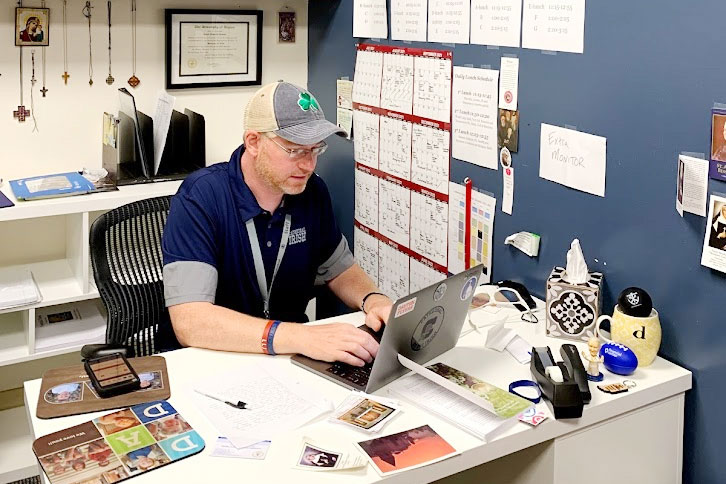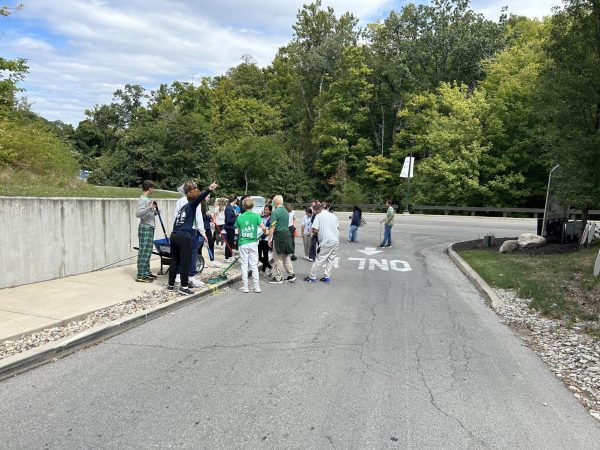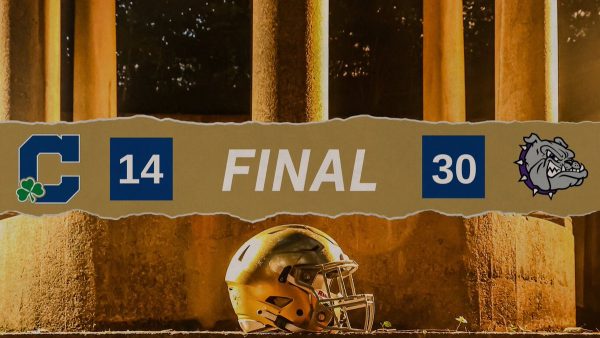Reconciliation continues on campus for second day
Sacrament will take place in the Shiel Student Life Center
Director of campus ministry Mr. Dave Neeson works in his office in the Shiel Student Life Center.
The Lenten season is a time for believers to focus on their faith and connect with God, and there are very few better ways to do so than participating in the Sacrament of reconciliation.
During Lent, students can participate in this Sacrament during their religion class, where priests such as Fr. Emmanuel Kallarackal volunteer their time to hear confessions.
Director of campus ministry Mr. Dave Neeson said Fr. Emmanuel is available during office hours every week, during which time he offers the Sacrament in the chapel.
Fr. Emmanuel said, “Mother Teresa would counsel others, saying ‘One thing is necessary for us: confession. Confession is nothing but humility in action. We call it penance, but really it is a Sacrament of love. Only in confession can we go in as sinners with sin and come out as sinners without sin. There’s no need for us to despair, no need for us to commit suicide, no need for us to be discouraged if we have understood the tenderness of God’s love.’ She said elsewhere, very simply, ‘Confession is Jesus and I, nobody else.’”
Neeson said, “At a Catholic institution, we should always offer Sacraments. This is one of the more powerful Sacraments, yet it is also poorly attended. We know how hard it is for kids to make it out to a church during the designated hours of confession, so if we can bring it here to their school day and give them the opportunity to feel God’s presence in the Sacrament, then that’s what we’ll do. We try to focus on it in Advent and in Lent as main seasons for reconciliation; however, we encourage people to go as often as they need,” he said.
“God never tires of forgiving us,” Neeson continued. “(We often) get tired of asking for forgiveness. I think that was Pope Francis that said that. There’s nothing we can do that can separate us from God’s love. I think we tend to believe the lie that we’re too messed up, that we can’t say that, and that it’s going to shock the priest. The reality is that Satan can’t create. He can distort, so all the sins we tend to confess are the same. Satan isn’t creative, so nothing’s new,” he said.
Neeson emphasized the importance of dispelling the myth that any one person’s sins are worse than another person’s sins.
Pre-pandemic reconciliation took place in the theater, providing ample opportunity for a few less-than-interested students to take naps. For this school year, confessions are being heard on the bottom floor of the Shiel Student Life Center.
Assistant campus minister Mrs. Sara Bozelli-Levine said that, as was the case during Advent reconciliation, the SLC will be divided in half by a partition, allowing for more space for participants to spend time in prayerful reflection.
For Bozelli-Levine, the most important part of reconciliation is the sense of forgiveness it offers. “It teaches me the power of forgiveness for others,” she said. “The feeling of the relief of things that burden us — when a priest does that, he’s standing in for Jesus. When we do that for each other, it gives us a chance for grace and to follow that example,” she continued. “That’s it for me. The feeling of being unburdened (is the most important thing).”
Bozelli-Levine also shared that she would like students not to be anxious about going to confession. “Consider it a conversation with Jesus,” she said.
Neeson said, “I think a lot of people look at (reconciliation) as focusing on the negative, but the reality is (that) confession focuses on the positive. It focuses on living in a freedom that you deserve to live in without carrying the sins that you carry.
“Anybody who wears glasses can walk around with little bits of dust on them without noticing it. The world becomes hazy. When they clean their glasses off, they see the world in a different way, and reconciliation is a way for us to clean our glasses and see our actions, and grow closer to God. That’s the only journey that matters,” he said.
Neeson continued, “I wish kids understood the power of (reconciliation). It’s so neat to watch some kids leave their confession — you can see the body’s changed, it’s different. Physically, they are walking more upright, they’re lighter, it’s great to watch.”
“When we receive Jesus’s forgiveness,” Fr. Emmanuel said, “He expects us to live as new people afterwards. It would make no sense to come to confess our sins if we intended to continue committing the same sins again. In weakness, we may commit the same sin again, but as we come to confession, if we do not intend to amend our lives, then surely we cannot say that we are truly sorry for our sins. Surely we can only say that we are genuinely sorry for our sins if we have a firm intention not to sin again.”

Nicholas Rodecap is a senior and co-editor-in-chief of the Megaphone. At Cathedral, he is a drum major in the Pride of the Irish marching band, a varsity...







